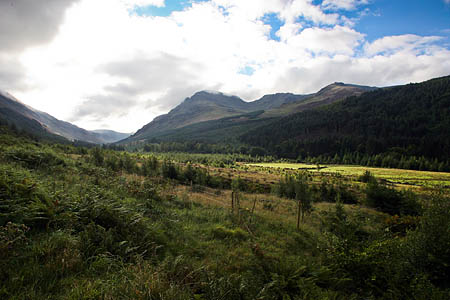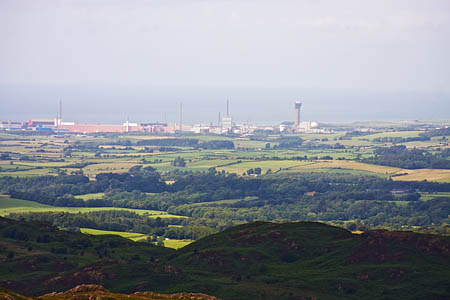
Ennerdale, one of three sites viewed as geologically suitable for the repository
The Lake District will not be the site of a new underground nuclear waste dump, councillors have decided.
Cumbria County Council’s cabinet today ended its interest in proceeding with the plans, which could have seen some of the national park’s wildest areas considered as the site for high-level nuclear waste.
Ennerdale and Eskdale, in the shadow of some of Lakeland’s best loved fells, were possible sites for the development.
Cumbria, plus the two district councils in Copeland and Allerdale, were the only English authorities to have maintained an interest in hosting the controversial underground radioactive waste site. Copeland District Council had decided to go to the next stage of consultations but, because the two district authorities needed the county’s agreement, the plans will go no further.
This leaves the Government with no English authority willing to accommodate the underground facility.
Cumbria County Council members also said the operators of the existing nuclear processing site at Sellafield on the county’s coast need to up their game.
Ten cabinet members made the decision today at their Carlisle meeting.
A Cumbria County Council spokesperson said: “The decision effectively ends Cumbria County Council’s four-year formal involvement in the [Managing Radioactive Waste Safely] process and puts an end to the doubts and concerns of many local people, which have escalated around the crucial decision from the three local authorities of Cumbria County Council, Allerdale Borough Council and Copeland Borough Council on whether to progress to the next stage of allowing the Government to conduct desk-top geological surveys.
“The nuclear industry is, and will continue to be, a key part of the Cumbrian economy.
“West Cumbria is a world-renowned centre for nuclear skills and expertise and the home of the UK’s nuclear industry.
“Most of the UK’s high-level radioactive waste is stored at Sellafield, and therefore what happens to that waste in the future is, and will continue to be, of vital interest to Cumbria.
“The findings of a National Audit Office report in November 2012 which looked at the way that the NDA and Sellafield Ltd were managing risk reduction at Sellafield clearly demonstrated the need for immediate improvements in the management of major projects at the site.
“The report criticised the site for posing a ‘significant risk to people and the environment’ because of the deteriorating conditions of radioactive waste storage facilities.
“Cumbria County Council said when the report was published that it will need to be closely involved in the Nuclear Decommissioning Authority’s improvement plan to improve the security and safety of interim storage and the management of the major investment that will continue to be needed into the site.”
Councillor Eddie Martin, leader of Cumbria County Council, said: “Cabinet believes there is sufficient doubt around the suitability of West Cumbria’s geology to put an end now to the uncertainty and worry this is causing for our communities.
“Cumbria is not the best place geologically in the UK. The Government’s efforts need to be focused on disposing of the waste underground in the safest place, not the easiest.
“Members have remained concerned throughout on the issue of the legal right of withdrawal if we proceed to the next stage.
“Despite assurances from Government that they intend to introduce this as primary legislation, we do believe that this could have been done far sooner to ease our concerns.
“The fact remains the right of withdrawal is not yet enshrined in statute and we could not take the risk of saying yes today without this being absolutely nailed down.
“Cumbria has a unique and world-renowned landscape which needs to be cherished and protected.
“While Sellafield and the Lake District have co-existed side by side successfully for decades, we fear that if the area becomes known in the national conscience as the place where nuclear waste is stored underground, the Lake District’s reputation may not be so resilient.”
Councillor Stewart Young, the county council’s deputy leader, added: “The case for investment in Sellafield is now more pressing than ever.
“We had always raised concerns over the lack of any ‘plan B’ from Government and the fact that west Cumbria was the only area to express an interest in the process left the Government with few options if we decided not to proceed.
“It is now time for the Government to secure the long-term future of the nuclear industry and put in place robust storage arrangements at Sellafield while it decides how to continue the search for a repository elsewhere in the UK.”
Ed Davey, Secretary of State for Energy and Climate Change, said: “We respect the decision made today by Cumbria councillors.
“They have invested a great deal of time in this project and have provided valuable lessons on how to take forward this process in future.
“While their decision to withdraw is disappointing, Cumbria will continue to play a central role in the energy and nuclear power sectors.
“We are clear that nuclear power should play a key role in our future energy mix, as it does today. I am confident that the programme to manage radioactive waste safely will ultimately be successful, and that the decisions made in Cumbria today will not undermine prospects for new nuclear power stations.
“It is however absolutely vital that we get to grips with our national nuclear legacy. The issue has been kicked into the long-grass for far too long.
“We remain firmly committed to geological disposal as the right policy for the long-term, safe and secure management of radioactive waste. We also remain committed to the principles of voluntarism and a community-led approach.
“The fact that Copeland voted in favour of entering the search for a potential site for a GDF demonstrates that communities recognise the benefits associated with hosting such a facility.
“For any host community there will be a substantial community benefits package, worth hundreds of millions of pounds. That is in addition to the hundreds of jobs and major investment that such a huge infrastructure project could bring.
“We will now embark on a renewed drive to ensure that the case for hosting a GDF is drawn to the attention of other communities.”
The Friends of the Lake District had opposed the plans and online activist group 38 Degrees organised a petition against the proposals, which attracted more than 21,500 signatures.

Melvyn Harland
30 January 2013Cumbria says No! I should think so. I can't belive the government and councils even gave the idea any thought at all. Our premier National Park - - the most beautiful l scenery in England and we think it would be a good place for a nuclear dump the size of a small city, it could only happen here.
But lets face it - - no matter where they eventually decide to put the dump - - it won't be anywhere in the south of England will it?
Angela
31 January 2013This was the right decision for Cumbria, Sellafield is a sad monument to human stupidity so lets not build another.
I am glad I am not in Copeland because they are displaying serious signs of desperation and for what, there is nothing to be gained from this dump and it is a shame that Copeland believes it can go it alone even though their web site has a council and democracy section, what gives them the right to ignore the majority of people living in Cumbria.
Building this anywhere in the Cumbria will have an adverse effect on the whole of Cumbria, hence why everyone needed to support it for it to proceed, they don't support it so that has to be the end of it.
Ang